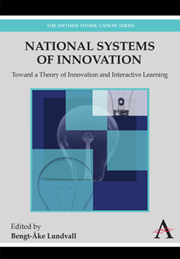Book contents
- Frontmatter
- Contents
- List of Tables
- List of Figures
- Preface
- 1 Introduction
- Part I Toward a New Approach to National Systems of Innovation
- Part II A Closer Look at National Systems of Innovation
- Part III Opening National Systems of Innovation: Specialisation, Multinational Corporations and Integration
- Notes
- References
1 - Introduction
Published online by Cambridge University Press: 05 March 2012
- Frontmatter
- Contents
- List of Tables
- List of Figures
- Preface
- 1 Introduction
- Part I Toward a New Approach to National Systems of Innovation
- Part II A Closer Look at National Systems of Innovation
- Part III Opening National Systems of Innovation: Specialisation, Multinational Corporations and Integration
- Notes
- References
Summary
Introduction
Theories in the social sciences may be regarded as ‘focusing devices’. Any specific theory brings forward and exposes some aspects of the real world, leaving others in obscurity. That is why a long lasting hegemony of one single theoretical tradition is damaging both in terms of understanding and policy-making. In the field of economics, the dominating neo-classical paradigm puts its analytical focus upon concepts such as scarcity, allocation, and exchange, in a static context. Even if these concepts reflect important phenomena in the real world, they only bring forward some aspects of the economic system. One aim of this book is to demonstrate the need for an alternative, and supplementary, focusing device which puts interactive learning and innovation at the centre of analysis.
Through more than a decade, a group of economists at Aalborg University, the IKE-group, has worked together studying industrial development and international competitiveness from such a perspective. This book presents results from this work in relation to one specific subject; national systems of innovation.
Our choice of perspective and subject is based upon two sets of assumptions.
First, it is assumed that the most fundamental resource in the modern economy is knowledge and, accordingly, that the most important process is learning. The fact that knowledge differs in crucial respects from other resources in the economy makes standard economics less relevant and motivates efforts to develop an alternative paradigm.
- Type
- Chapter
- Information
- National Systems of InnovationToward a Theory of Innovation and Interactive Learning, pp. 1 - 20Publisher: Anthem PressPrint publication year: 2010
- 42
- Cited by

